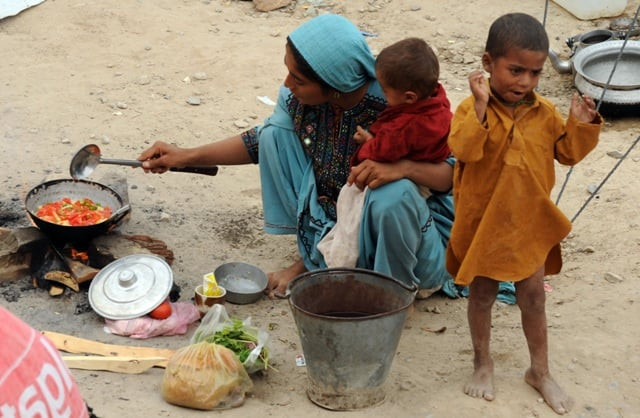Why don’t they eat cake?
Struggling to make ends meet, many Pakistanis still live below the poverty line

Some basic food items are still out of reach of the poor, but almost everybody below the poverty line owns a smartphone -- Representational Image (PHOTO: FILE/AFP)
Something was not quite right — I was unconvinced by the pure vulgarity of the idea of requiring mobile phone or a computer in a country where access to education is already a challenge. What I found by contacting friends and colleagues was simply unbelievable. Everyone I contacted knew about the practice of sending homework and school-related information via WhatsApp. It was widespread. It is assumed that everyone has a smartphone. The practice is becoming increasingly common in schools and colleges, and anyone unable to access it gets left behind in an increasingly competitive environment.
I don’t know when it started, but I am deeply disturbed by this development. While we argue that education is a great equaliser, the source of social mobility; we ensure that those with the most modest means are unable to access the same education that is supposed to propel them up. Is a smartphone a requirement for education? In a country where it is becoming increasingly hard to afford basic utilities, there are stock-outs of medicines, should we now expect everyone to own a smartphone even when they cannot afford one? How much more are we going to burden our citizens? How many more basic rights are we going to take away from them?
I am all for technology and believe when used appropriately, it has tremendous potential for social change. But in a country like Pakistan, lack of access to technology can also create new social barriers. The previous Punjab government and its IT leadership take pride in digitising all the textbooks — but what if some people don’t have access to computers or smartphones? Should they become yet another group to be left out of our national development, like so many we have pushed out before?
The young girl whose mother contacted us will get a smartphone, and we hope she succeeds in her academic endeavours. But that doesn’t solve the problem, i.e. our lack of empathy. Our assumptions go well beyond education. At a recent meeting on antimicrobial resistance, a colleague from a major development agency suggested that the core problem in Pakistan is that people in rural areas do not wash their hands with clean water. But what if they don’t have clean water, someone asked. The colleague from the agency was flustered but kept pushing that the problem was in behaviour, not in access.
Policymakers, whether at the secretariat or in colleges, live in a world far away from those whose life is a lot harder than we can ever imagine. Our assumptions on access, whether to water or technology, come from our entitled imagination and not from engagement with those we aim to educate or serve.
One of these days when there may be a shortage of bread, one of us will ask, “but why don’t they eat cake?”
Published in The Express Tribune, October 1st, 2019.
Like Opinion & Editorial on Facebook, follow @ETOpEd on Twitter to receive all updates on all our daily pieces.














COMMENTS
Comments are moderated and generally will be posted if they are on-topic and not abusive.
For more information, please see our Comments FAQ